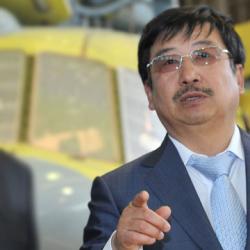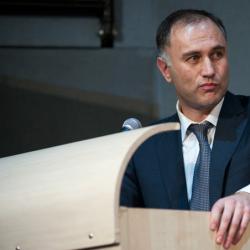Academic degrees and titles: who is who. Scientific degrees in Russia in ascending order: we understand the scientific hierarchy What are scientific degrees
A qualification system has been created in universities, according to which academic degrees are arranged in ascending order. But what academic degrees are easy to answer - these are candidates and doctors of science. In order to receive a degree, applicants must publicly defend a dissertation. It takes a lot of time and effort to prepare such a voluminous scientific material. You can, of course, get by with a scientific report containing the final results of developments and research. But this path is available only to already well-known people who have many publications of scientific papers.
In connection with the transition to the Bologna system of education, several more degrees appeared:
- The bachelor's degree is the lowest possible degree. It is received by a university graduate after studying for 4 years and defending a diploma. It used to be called "incomplete higher education";
- Specialist - assigned after five years of study at a university;
- Master - study period is 6 years. The graduate receives this degree after an additional two years of study and having defended a second thesis.
Often, when asked what academic degrees are, they answer - associate professor or professor. In this case, concepts are substituted - these are not academic degrees, but academic titles. Moreover, the academic title, supported by a documented official certificate. Non-certified employees can also hold the position of associate professor or professor. The title is given for life, and the position may be temporary.
Academic titles differ by department and specialty, they are scientific and pedagogical, so it is not surprising to get confused in all these ups and downs. Some people holding the position of professor proudly refer to themselves as "professors", although they have nothing to do with the academic title. In this matter, the military are more modest - having colonel's shoulder straps, no one will ever call himself a general in a general's position. Some non-state educational institutions independently, without involving the Higher Attestation Commission, award academic degrees of candidate or doctor of science and issue so-called crusts. As a rule, the legal side of such documents still needs to be proven.
Understanding what degrees are and how they differ from academic titles is not as easy as it seems, but the main points are as follows:
- After defending the dissertation, the applicant is awarded a scientific degree, and according to the results of scientific and pedagogical activity, an academic title is awarded.
- The diploma of a candidate or doctor of science confirms the academic degree, and the certificate of an associate professor or professor confirms the academic title.
- Getting a degree is more difficult than a title, so all efforts should be directed specifically to defending a dissertation.
People who have high titles or academic degrees are treated more respectfully, so the desire for the highest form of self-realization and self-expression is still strong. But to achieve a high position in society is not easy, but possible.
INTRODUCTION
1. ACADEMIC DEGREES………………………………………………………..2
2. ACADEMIC RANKS……………………………………………………….....7
3. STATUS OF BACHELOR AND MASTER DEGREES IN RUSSIA……………………………………………………………………......8
4. WHY DO YOU NEED A DEGREE……………………………………….9
6. NOMENCLATURE OF ACADEMIC DEGREES………………………………...11
7. HONORARY DEGREE……………………………………………………… 12
8. CONCLUSION……………………………………………………………….12
9.LIST OF USED LITERATURE……………………..…13
Introduction
Academic degrees and titles - a qualification system in science and higher education, which allows ranking scientific and scientific-pedagogical employees at individual stages of an academic career. Currently, in the Russian Federation, the degrees of candidate and doctor of sciences are awarded and the academic titles of associate professor and professor are awarded (by department, by specialty). As a rule, the academic title of associate professor is assigned to candidates of sciences, and the academic title of professor is usually awarded to doctors of sciences.
Degrees
Degrees awarded in different countries vary significantly in terms of titles, qualification requirements, award and/or approval procedures.
In the USA, Great Britain and a number of other European countries that have joined the Bologna process, the nomenclature of academic degrees is being harmonized, which involves the establishment of uniform requirements for three degrees in each field of knowledge:
bachelor or licentiate
Bachelor (from Latin baccalarius - “young man”, in turn from Latin bacca lariu - fruit of the laurel) is an academic degree or qualification awarded to students after mastering the basic training program. It first appeared in the medieval universities of Western Europe. In Russia, this level of training was introduced in 1993. The normative term of the bachelor's program (with full-time education) is 4 years. After December 31, 2010, bachelor's and master's qualifications will become the main qualifications for applicants to Russian universities.
master's
Master (from lat. magister - mentor, teacher, leader) - the highest academic degree, qualification (in some countries - the initial academic degree), acquired by the student after graduating from the magistracy (mastering a special training program). Master's degree is a stage of higher professional education, following the post-bachelor's degree, which allows to deepen specialization in a particular professional area. In 1993, the term "master" returned as a qualification for graduates of educational institutions of higher professional education. The position of the magistracy in the modern Russian education system is dual. On the one hand, this is a system of advanced training for bachelors and specialists, on the other hand, the “master” qualification is equated to the qualifications of university graduates. The normative term of the master's program (with full-time education) is 2 years. However, the student must first master the training program for a bachelor (4 years) or a specialist (5 years). After December 31, 2010, bachelor's and master's qualifications will become the main qualifications for applicants to Russian universities.
Doctor of Philosophy (here, philosophy refers to sciences in general, and not philosophy proper; in parallel, there are similar degrees of Doctor of Law, Medicine, Theology, etc.)
Doctor of Philosophy (lat.Philosophiæ Doctor, Ph.D., PhD, usually pronounced as pi-h-di) is a degree awarded in many Western countries. The actual analogue of the academic degree "Doctor of Philosophy" in the Russian education system is the academic degree "Ph.D.". philosophy (only historical) and is awarded in almost all scientific fields, for example: Ph.D. in literature or Ph.D. in physics. This situation is connected with traditions dating back to the days of medieval universities, the standard structure of which usually assumed the presence of faculties of philosophy, jurisprudence, theology and medicine. Therefore, in addition to the Ph.D. degree, there are also a limited number of other doctoral degrees of the same rank; doctors are awarded the degree of M.D., lawyers are awarded the degree of Doctor of Laws, theologians are awarded the Doctor of Divinity, and everyone else is awarded the Doctor of Philosophy.
In Russia, the system is currently mixed: the new system is partially applied with the release of bachelors (4 years) and masters (6 years), partly the old one with the release of graduates (5 years). Instead of the highest single Western degree of doctor (philosophy, etc.), the German-style system inherited from the Soviet Union is used, in which there are two degrees:
PhD
Candidate of Sciences - a first-stage academic degree (doctor of science) in the USSR, the Russian Federation and a number of CIS countries. Established by a decree of the Council of People's Commissars of the USSR of January 13, 1934. In Russian universities, a candidate's degree is one of the sufficient conditions for participation in the competition for the position of associate professor. Order of assignment: in Russia, the degree of candidate of sciences is awarded by the dissertation council based on the results of defending a candidate's dissertation. Then the Higher Attestation Commission of Russia makes a decision to issue a PhD diploma.
Scientific branches:
PhD in Architecture (PhD)
Candidate of Biological Sciences (Ph.D.)
Candidate of Veterinary Sciences (PhD)
Candidate of Military Sciences (PhD)
Candidate of Geographical Sciences (Ph.D.)
Candidate of Geological and Mineralogical Sciences (PhD)
Candidate of Art History (Ph.D.)
Candidate of Historical Sciences (Ph.D.)
PhD in Cultural Studies
Candidate of Medical Sciences (Ph.D.)
Candidate of Pedagogical Sciences (PhD)
PhD in Political Science (Ph.D.)
Candidate of Psychological Sciences (Ph.D.)
Candidate of Agricultural Sciences (Ph.D.)
Candidate of Sociological Sciences (Ph.D.)
Candidate of Technical Sciences (Ph.D.)
Candidate of Pharmaceutical Sciences (Ph.D.)
Candidate of Physical and Mathematical Sciences (Ph.D.)
Candidate of Philological Sciences (PhD in Philology)
Candidate of Philosophical Sciences (PhD in Philosophy)
Candidate of Chemical Sciences (PhD)
PhD in Economics (PhD)
PhD in Law (PhD)
Ph.D
Doctor of Science - a second degree, the highest level (after a candidate of sciences) in the USSR, Russia, a number of CIS countries and in some former socialist countries. In Russian universities, the doctoral degree is one of the sufficient conditions for participation in the competition for the position of professor.
Scientific branches:
Depending on the specialty in which the doctoral dissertation is defended, the applicant is awarded one of the following academic degrees:
Doctor of Architecture (Dr. Arch.)
Doctor of Biological Sciences (D.Sc.)
Doctor of Veterinary Sciences (D.V.N.)
Doctor of Military Sciences (Doctor of Military Sciences)
Doctor of Geography (Dr. Sc.)
Doctor of Geological and Mineralogical Sciences (D.G.-M.S.)
Doctor of Arts (D.Sc.)
Doctor of Historical Sciences (D.H.)
Doctor of Cultural Studies
Doctor of Medical Sciences (D.M.S.)
Doctor of Pedagogical Sciences (D.P.S.)
Doctor of Political Sciences (Ph.D.)
Doctor of Psychological Sciences (D.Sc.)
Doctor of Agricultural Sciences (D.Sc.)
Doctor of Sociological Sciences (D.Sc.)
Doctor of Technical Sciences (D.Sc.)
Doctor of Pharmaceutical Sciences (Doctor of Pharmacy)
Doctor of Physical and Mathematical Sciences (D.Sc.)
Doctor of Philology (Doctor of Philology)
Doctor of Philosophy (Doctor of Philosophy)
Doctor of Chemical Sciences (D.Sc.)
Doctor of Economics (D.E.S.)
Doctor of Law (Doctor of Law)
At the same time, the degree of candidate of science is awarded by the dissertation council and approved (a decision is made to issue a diploma of a candidate of science) by the Higher Attestation Commission of the Ministry of Education and Science of Russia, and the degree of doctor of science is awarded by the presidium of the Higher Attestation Commission on the basis of a petition from the dissertation council.
To obtain the degree of candidate or doctor of science, it is necessary to prepare a dissertation and defend it at a meeting of the dissertation council. Academic degrees appeared in the USSR in 1934 (introduced by the decree of the Council of People's Commissars of the USSR "On Academic Degrees and Titles" dated January 13, 1934, which actually restored academic degrees that previously existed in pre-revolutionary Russia). The largest number of candidates and doctors of sciences in technical, medical, physical and mathematical sciences.
The equivalent of the PhD degree in most countries is the Ph.D. An approximate analogue of the degree of Doctor of Science in countries with a "single-stage" system of academic degrees is the degree of Doctor of Science (D.Sc.), in countries with a "two-stage" system (for example, in Germany) - a habilitated doctor.
From the standpoint of statistics, any citizen who works creatively in science has the right to be called a scientist. But do not forget another important truth: "Without a piece of paper you are a bug, but with a piece of paper you are a person." Especially in a society that occupies not the last place in the world in terms of formalism, bureaucracy. So, if you want to be considered a scientist, present a certificate stating that you are a scientist. Such certificates are diplomas and certificates, indicating the presence of an academic degree or title. So, in the beginning it is necessary to sort out these very degrees and titles, the presence of which is confirmed by documented scientific authorities authorized to do so.
In accordance with the legal framework for assessing the qualifications of scientists and the criteria for determining this assessment, provided by the state certification system, the following academic degrees and academic titles have been established in the Russian Federation for scientific and scientific-pedagogical personnel of the highest qualification:
· the scientific degree of doctor of science in the field of science according to the nomenclature of specialties of scientists;
· Candidate of science degree in the field of science according to the nomenclature of specialties of scientists.
Doctorate degree is awarded by the Higher Attestation Commission on the basis of a petition from the Dissertation Council, adopted based on the results of a public defense of a dissertation by an applicant with a PhD degree, taking into account the conclusion of the relevant expert council of the Higher Attestation Commission on the compliance of the submitted dissertation with the established criteria.
PhD degree is awarded by the dissertation council based on the results of a public defense of a dissertation by an applicant with a higher professional education.
Thesis for the degree of Doctor of Science should be a scientific qualification work in which, on the basis of the research performed by the author, theoretical provisions have been developed, the totality of which can be qualified as a new major scientific achievement, or a major scientific problem of great socio-cultural or economic importance has been solved, or science-based technical, economic or technological solutions are presented, the introduction of which makes a significant contribution to the development of the country's economy and increase its defense capability.
Thesis for a degree Candidate of Sciences should be a scientific qualification work that contains a solution to a problem that is essential for the relevant branch of knowledge, or scientifically based technical, economic or technological developments that are essential for the economy or ensuring the country's defense capability.
According to Art. 22 of the Federal Law of August 22, 1996 "On Higher and Postgraduate Education" in the Russian Federation, the academic titles of professor and associate professor are established.
The Unified Register of Academic Degrees and Academic Titles, approved by the Decree of the Government of the Russian Federation of January 30, 2002, established the following academic titles for scientific, technical and scientific workers:
· professors
· associate professor in the department of an educational institution of higher professional and additional professional education;
· professors by specialty according to the nomenclature of specialties of scientific workers;
· associate professor in the specialty according to the nomenclature of specialties of scientists.
According to paragraph 6 of the Regulations on the procedure for conferring academic titles, approved by the Decree of the Government of the Russian Federation of March 29, 2002, academic title of professor in the department can be awarded to doctors of science who, under an employment contract, fill the positions of a professor, head of a department, dean of a faculty, head of a branch or institute, vice-rector, rector of a university or advanced training institution, if they have published educational, methodological and scientific works, read a course of lectures at high professional level, as well as at the time of submission of attestation documents:
· have at least ten years of experience in scientific and pedagogical work, of which at least five years of pedagogical work in universities or institutions for advanced training;
have trained as academic supervisors or academic advisors, usually at least two students who have been awarded academic degrees.
Academic title of professor in the specialty can be awarded to doctors of sciences who, under an employment contract, fill the positions of a leading researcher, chief researcher, head (head) of a research department (department, sector, laboratory), scientific secretary, deputy director, director in scientific organizations, scientific departments of universities or advanced training institutions and the relevant requirements of clause 11 of the Regulations.
One of the main conditions for conferring the academic title of professor is that the employee has the academic degree of Doctor of Science. However, the academic title of professor in the department can be awarded without defending a doctoral dissertation to candidates of science (as an exception), artists, specialists in physical culture and sports, major specialists who have received international or all-Russian recognition in a particular field of knowledge, if their activities comply with the requirements of paragraph 1 of Art. 6 - 10 Regulations on the procedure for conferring academic titles.
Academic title of associate professor in the department may be awarded to doctors and candidates of sciences who, under an employment contract, fill the positions of associate professor, professor, head of department, dean of a faculty, head of a branch or institute, vice-rector, rector of a university or advanced training institution, if they have published educational, methodological and scientific works, read the course lectures or conduct classes at a high professional level, as well as at the time of submission of attestation documents:
· successfully work in the specified positions during the year;
· have at least five years of experience in scientific and pedagogical work, of which at least three years of pedagogical work in universities or institutions for advanced training;
Academic title of associate professor in the specialty can be assigned to doctors, candidates of sciences, who, under an employment contract, replace the positions of a senior researcher, chief researcher, head (head) of a research department (department, sector, laboratory), scientific secretary, deputy director, director in scientific organizations, scientific divisions universities and institutions for advanced training and the relevant requirements of paragraph 17 of the Regulations of March 29, 2002
Assistant professor, as a minimum, must have a Ph.D. At the same time, if there are conditions specified in paragraphs 13 - 16 of the Regulations on the procedure for conferring academic titles, the academic title of associate professor can be awarded without defending a dissertation, as an exception, to persons with higher education, artists, specialists in physical culture and sports, highly qualified specialists who have received international or all-Russian recognition in a particular field of knowledge.
Thus, academic degrees and titles - a qualification system in science and higher education, which makes it possible to rank scientific and scientific-pedagogical employees at individual stages of an academic career.
The terms "academic degree" and "academic title" are associated with people who are engaged in scientific professional activities. Most often these are teachers at universities, institutes, technical schools.
Types of academic degrees
An academic degree reflects the qualifications of a scientist in the scientific field. There are two types of degrees:
- PhD.
- Ph.D.
An academic degree can only be awarded if there is a dissertation (candidate's and doctoral, respectively), which must be written while studying at graduate school or doctoral studies. At the same time, conditions must be met that confirm the active scientific activity of the dissertation candidate and the approbation of his work. These include the publication of scientific articles in specialized journals and participation in scientific conferences, including foreign ones. 
In addition, the awarding of a scientific degree is preceded by the process of public defense of the written scientific work at a meeting of a specialized academic council, which is created at a higher educational institution. In the process of transition of education to the European level, the degree of "Doctor of Philosophy" (Ph.D) is introduced, which is equated to the traditional "PhD".
Anyone with a higher education can enter graduate school and defend a PhD thesis. But only a candidate of sciences who has already taken place can enter the doctoral program. At the same time, it is not at all necessary that the specialization of the candidate's and doctoral dissertations coincide. So, the first can be written in technical sciences, and the second in philosophical, or vice versa. Confirmation of the implementation of a huge and painstaking work, its recognition is carried out by obtaining an appropriate diploma.

The highest degree of professionalism and competence is considered to be the degree of a doctor of science, but it is less common than a candidate of science. This is due to the increased requirements for the preparation and defense of a doctoral dissertation. In other words, it is much easier to write and defend a candidate's work than a doctoral one. Therefore, not all scientists, having received the opportunity to work at a university, decide to write a doctoral dissertation. But those who dare and successfully cope with this task receive many privileges. These include getting the highest position in an educational institution, securing a job, receiving a salary allowance, the opportunity to lead leadership positions and participate in meetings of specialized candidate or doctoral dissertation councils, not to mention the status and respect that is surrounded by doctors of science.
Types of academic titles
After fulfilling certain conditions related to scientific activity, with a certain experience, the teacher is awarded one of the following titles:
- Assistant professor.
- Professor.
The title of associate professor can be obtained by an accomplished candidate of sciences who is actively engaged in scientific activities after defending his dissertation, publishes his scientific articles in specialized journals, methodical literature, takes part in scientific conferences, and also has a certain teaching experience, of which one is an associate professor. It can be seen from this that there is some confusion, since academic titles are consonant with some positions of research workers, so they will be discussed below.

The title of professor can be obtained by a doctor of sciences, who, like a candidate, is engaged in improving his qualifications, scientific works, their approbation, printing his textbooks and has deep knowledge in a certain field of science. It is desirable that the scientific work of a doctor of science also manifests itself in the guidance of graduate students. A prerequisite is also the presence of experience, including the position of professor. The supporting document is a certificate of conferment of the relevant academic titles.
The benefits of being a professor closely overlap with those of earning a doctorate.
Job types
Teachers in higher educational institutions can work in the following positions:
- Assistant.
- Senior Lecturer.
- Assistant professor.
- Professor.
Assistants are young scientists who do not have a degree, graduate students who are writing a Ph.D. thesis, or applicants after defending it.
The position of a senior lecturer can be held by a candidate of sciences without work experience and scientific achievements. After fulfilling these conditions, the candidate of sciences has the right to hold the position of associate professor without having this title yet! And only after working as an associate professor for a certain period of time, having written the required number of scientific papers during this time, the candidate of sciences receives the title of associate professor.
In this case, the assistant professor works in the same position. At the same time, he has the right to hold the position of professor, has a certain scientific experience and merits in scientific developments. A doctor of sciences always holds the position of a professor, even if he has not yet received such a title.
From the above information it follows that the concepts under consideration are closely related to each other and obtaining the latter directly depends on degree certifying a degree. But there are still differences between them: a dissertation work is a necessary circumstance for awarding a scientific degree, and a title is the assignment of a scientific degree. That is, to obtain an academic title, it is also necessary to write and defend a dissertation.
Degrees
Degrees awarded in different countries vary significantly in terms of titles, qualification requirements, award and/or approval procedures.
To obtain the degree of candidate or doctor of science, it is necessary to prepare a dissertation and defend it at a meeting of the dissertation council established at a university, research institute or other scientific institution. To defend a dissertation for the degree of Doctor, it is currently necessary to have a PhD degree, the defense of a dissertation for the degree of Doctor of Science by persons who do not have a candidate degree, in accordance with the current "Regulations on the procedure for awarding academic degrees", is not provided. It should be noted that in this case, the correspondence or affinity of the branches of science and specialties previously obtained (consecutively) of higher education, the degree of candidate of science and the degree of doctor of science is actually not regulated in any way, except for cases of competition for scientific degrees in medical and veterinary sciences, which are possible only if applicant for higher medical (veterinary) education. In fact, in practice, cases of obtaining a higher degree in a branch of science and a specialty unrelated to an existing one are recognized as quite acceptable and are not limited in any way by the Higher Attestation Commission: for example, a candidate of economic sciences by engineers (mathematicians, chemists), a doctorate in economic sciences by candidates, for example, technical and physical mathematical sciences, etc. .
In parallel, there are similar degrees of Doctor of Laws, Theology, etc., awarded by an accredited institution of higher education. The degrees of Doctor of Laws (DL), Medicine (DM), Business Administration (DBA), etc., are considered in many countries as part of a professional rather than an academic/research doctoral system, i.e. it is assumed that the holder of such a degree is usually engaged in practice, not science. These degrees also do not require independent research, so a professional doctorate is not usually considered a degree. The assignment of a degree to a professional or research doctorate depends on the country and even on the specific university; Thus, in the USA and Canada, the degree of Doctor of Medicine is professional, and in Great Britain, Ireland and many countries of the British Commonwealth - research. A number of universities in the UK (including Oxford and Cambridge) even include the degree of Doctor of Medicine in the higher doctorate (the approximate equivalent of a Doctor of Science in Russia), requiring a significant contribution to medical science.
Academic titles
In Russia, academic titles are currently divided into the titles of associate professor (or professor) by specialty And by department. Since 2011, academic titles both in the department and in the specialty have been awarded by orders of the Minister of Education and Science on the proposal of the Higher Attestation Commission. Qualification requirements for applicants for academic titles in the department and in the specialty are somewhat different, for example, to be nominated for the academic title of professor in the department, you must be the author (co-author) of textbooks or study guides, which is not required for the title of professor in the specialty. But a professor in the specialty needs a larger number of people who defended candidate dissertations under his supervision: for a professor in a department - as a rule, at least two, for a professor in a specialty - as a rule, at least five.
In addition, the requirements differ within each category (professor in the department, associate professor in the department, professor in the specialty, associate professor in the specialty). So, it is allowed to assign the academic title of professor in the department to persons with the degree of Candidate of Sciences, and associate professor - to persons who do not have a degree, but the requirements for them are much stricter than for applicants with the degree of Doctor and Candidate of Sciences, respectively. Special requirements are imposed on applicants for an academic title who are workers of culture and art and have the appropriate honorary titles (People's Artist, Honored Artist, etc.), as well as workers of physical culture and sports who have the title of Honored Coach. In addition, it is allowed to award the academic title of professor in the department to major specialists who have received international or Russian recognition in the relevant field of knowledge.
According to the system in force in Russia and Belarus, in order to obtain the academic title of professor, it is not necessary to have the academic title of associate professor.
Previous academic degrees and titles
The academic title of senior researcher is currently not awarded in the Russian Federation, it is equated to the title of associate professor in the specialty. Previously (and currently in Ukraine and some other post-Soviet states), the title of senior researcher was awarded to employees of research institutes, and the qualification requirements for applicants for this title did not include teaching work in universities, in contrast to the title of assistant professor.
Until the 1950s in the USSR there was an academic title "senior laboratory assistant".
Before the revolution, in the scientific and educational system of Russia there were academic degrees of a real student, a candidate (more precisely, a university candidate), a master's degree and a doctorate, the academic titles of an adjunct, a private docent, an assistant professor, an adjunct professor, an extraordinary professor, an ordinary professor, an honored professor. This entire hierarchy was completely abolished in 1918 (although some of the listed degrees and titles were abolished in the 19th century). Academic degrees in the Russian Empire gave the right to receive ranks of a certain class (see Table of Ranks).
Position of bachelor's and master's degrees in Russia
Prior to the implementation of the Bologna recommendations, bachelor's and master's degrees in Russia do not refer to academic degrees, but to qualifications (degrees) of graduates of educational institutions of higher professional education.
Nomenclature of academic degrees
Depending on the specialty in which the dissertation is defended, the applicant is awarded one of the academic degrees.
Honorary Degree
The honorary degree of doctor of science (Honor Doctor or Honor degree or Doctor honoris causa) is issued by universities, academies or the Ministry of Education without taking a course of study and without taking into account the mandatory requirements (for publications, defense, etc.), but who have achieved great success in business and who gained fame in any field of knowledge (artists, jurisprudence, religious figures, businessmen, writers and poets, artists, etc.). Such people are involved in teaching activities and give lectures in the best universities in many countries of the world. An honorary doctorate degree is not awarded in medicine.
An honorary degree can be awarded and withdrawn.
Non-governmental organizations
Religious organizations can confer PhD (doctor) degrees in theology (or theology), professors and associate professors, etc. Other non-state organizations can also confer various academic degrees and titles, up to and including academician (see Non-State Academies). However, all these degrees and titles are not legally such in Russia and do not give their holders the rights provided for by the laws of the Russian Federation.
Contemporary discussions
Currently, there is a discussion about the possibility of transferring the scientific and qualification powers of the VAK to the academic councils of universities and research institutes (including non-state ones), as is done in many Western countries. Opponents of such a transfer express an opinion about the inevitable devaluation of the system of academic degrees and titles as a result of the loss of state control over the attestation of scientific and scientific-pedagogical personnel.
Notes
Related links
- Website of the Higher Attestation Commission of the Ministry of Education of the Russian Federation
- Baleevskikh L.S., Muranov A.I. Domestic history of the normative regulation of nomenclatures of specialties of scientific workers in relation to jurisprudence // Jurisprudence. - 2008. - No. 5. - S. 243-259.
| Qualifications, degrees and titles in science and education | |
|---|---|
| University graduates | |






